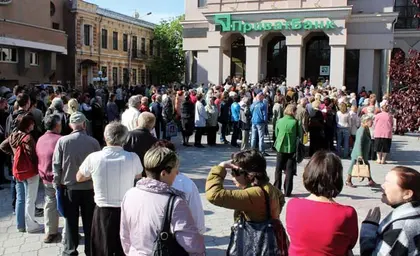Meat, fish, potatoes and bread experienced the greatest price hikes. For instance, pork doubled to $10-$11 per kilogram, while it’s $5 in Kyiv.
Tetyana Hetman, market analyst for APK-Inform news and expertise agency, foresees no declines. “Meat in Crimea will be more expensive than in Russia, as prices will jump at least by another 10-20 percent, if it is imported from Russia,” she said.
JOIN US ON TELEGRAM
Follow our coverage of the war on the @Kyivpost_official.
That is bad news for Crimeans, since dairy and meat products make up about two-thirds of local household food consumption.
However, the Crimean Statistical Service reports only a 5.7 percent increase in food prices for the end of April, which drove the overall consumer price index up by 3.9 percent in month-on-month terms.
Retailers doing business in Crimea used to purchase food products in Ukraine and supply them to the peninsula, but Russian products are proving to be 40 percent pricier, not counting the increased transportation costs.
Russia attempted to ban trucks transporting Ukrainian food from entering Crimea on May 17-18, but they had to lift the ban to avoid starvation on the peninsula, a representative of a major retailer told the Kyiv Post. He refused to be identified by name because the company’s public relations strategy bans commenting on business conditions in Crimea.
People have noticed though.
“Shelves with dairy products and confectionery are empty; prices for meat are twice higher,” said local retiree Anton Ivanov, who is not happy about overpriced Russian food, while his pension is “much lower than the Russian one.”
Pricey food is not the only problem of people residing in Crimea. After Russia occupied the peninsula in March, Ukraine-registered banks closed their branches in Crimea. Minor Russian banks are operating, but have not filled the void yet.
Meanwhile, Crimean Igor Evtushenko was 702nd on a waiting list to pay his utility bills, a simple procedure that took him two weeks to do. “Ukrainian banks are closed and Russian ones are still not open. It is a complete mess,” Evtushenko said.
Prices for utility services in Crimea are the same for now. However, low-income workers fear price rises also.
Other changes are threatening too. Prices for many medicines have left many without the means to purchase effective medical treatment. “The prices went up and we are experiencing a lack of many imported drugs which people used to buy. And we don’t know when we’ll have it in our drugstore,” said one local pharmacist, who refused to give her name for fear of being dismissed from her job.
“We are living in total uncertainty; the rules are changing very fast. Companies have adopted a wait-and-see approach to what is going to be next. To avoid risks, they prefer not to do anything,” said Vilor Osmanov, executive director of the Crimean International Business Association (CIBA).
After annexation, Crimea lost most international companies, according to CIBA. Among them are McDonald’s fast food chain, SushiYa restaurant, Bershka, Stradivarius and Zara clothing shops and GfK marketing research company. Energy giant Shell has halted negotiations over drilling projects on the Black Sea shelf.
Even Crimean wineries are considering relocating from the peninsula to mainland Ukraine, from where around 30-40 percent of their grape yields come.
The Crimean business environment gets even more complicated as all financial transactions made through Russian banks take at least three days. Goods coming from Ukraine are being taxed twice with value added tax, both by Ukraine and Russia.
One major positive change in Crimea is the decrease in gasoline prices. A-95, the most popular blend of gasoline, costs 19 percent less than in Kyiv, yet public transportation prices in Simferopol increased from Hr 2.75 to 3.3.
Iana Koretska can be reached at HOTTPOINT@GMAIL.COM
You can also highlight the text and press Ctrl + Enter




